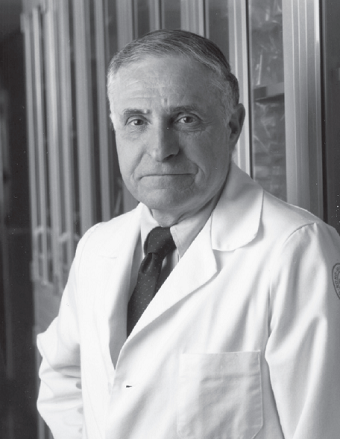Alumnus Dr. Jules Hirsch leaves bequest to UT Southwestern

Courtesy of the Rockefeller University
By Sharon Reynolds
Throughout his life, Dr. Jules Hirsch remained thankful for the privilege of studying medicine at Southwestern Medical College (now UT Southwestern Medical School). He passed away July 23, 2015, in New Jersey at the age of 88, and in his will, he left $244,587 to UT Southwestern Medical School, “in gratitude to the students and teachers of the Class of 1948 who introduced me to the profession of medicine.”
Dr. Hirsch was born in 1927 in New York City to Eastern European immigrants and grew up in New Jersey. While a student at Rutgers University, he applied to various medical schools, but was repeatedly turned down due to fierce competition caused by widespread restrictions at that time on the number of Jewish students universities and medical schools accepted.
He was finally admitted to a new medical school that had recently opened in Dallas – Southwestern Medical College – and earned his medical degree in 1948, at the age of 21. After graduation, he served in the Public Health Service before joining the faculty in 1954 at the Rockefeller Institute in New York City (now Rockefeller University). He spent a long, distinguished career at Rockefeller and is famous for his clinical investigations that helped reframe the modern understanding of obesity.
The popular perception at that time was that obese people were to blame for their own condition because they were lazy or lacked willpower, which Dr. Hirsch believed to be the biggest misunderstanding in medicine. For decades, he observed obese patients who shed pounds but failed to keep them off.
By the late 1980s, studies had linked obesity to metabolism, the chemical process by which the body converts food into energy. Dr. Hirsch and his team of researchers conducted a 10-year study focused on why some people gain weight and others do not by examining 41 human subjects – some obese, some lean – in the Rockefeller Hospital. His landmark study’s findings, released to acclaim in 1995, demonstrated that many people are biologically predisposed to be overweight, and even when they manage to lose weight, biological processes work against them in successfully keeping it off.
Dr. Hirsch’s nephew, Norman Silber, remembers his uncle as extremely intelligent and generous, with a tremendous variety of interests. He loved all living things.
“My uncle always had great compassion for others and was very people-oriented,” said Mr. Silber. “His greatest impact was focusing his medical research on real people with real medical problems, and treating diseases as they affected patients.”
Dr. Hirsch and his team made great advances in the study of nutrition and obesity. He proved one of the ways in which human body weight is regulated, and also determined that people can reduce their risk of diabetes or high blood pressure by losing weight and restricting calories. He developed the framework for much of the obesity research that is carried out today and trained many scientists currently leading the field. He was also a valued adviser for national programs aimed at curtailing the obesity epidemic in the U.S.
“From the time Dr. Hirsch graduated in 1948, he sought to fulfill a purpose greater than just his own success,” said Dr. Daniel K. Podolsky, President of UT Southwestern. “His research was pivotal in helping the world understand that obesity is not caused by any personal failing, but by biological predisposition. His generous bequest will continue his commitment to helping others by strengthening the foundation of support that makes UT Southwestern Medical Center a leader in academic medicine.”
To learn about giving to UT Southwestern by will or trust or other estate planning opportunities, call 214-648-2344 or visit engage.utsouthwestern.edu/planned-giving.
Dr. Podolsky holds the Philip O’Bryan Montgomery, Jr., M.D. Distinguished Presidential Chair in Academic Administration, and the Doris and Bryan Wildenthal Distinguished Chair in Medical Science.